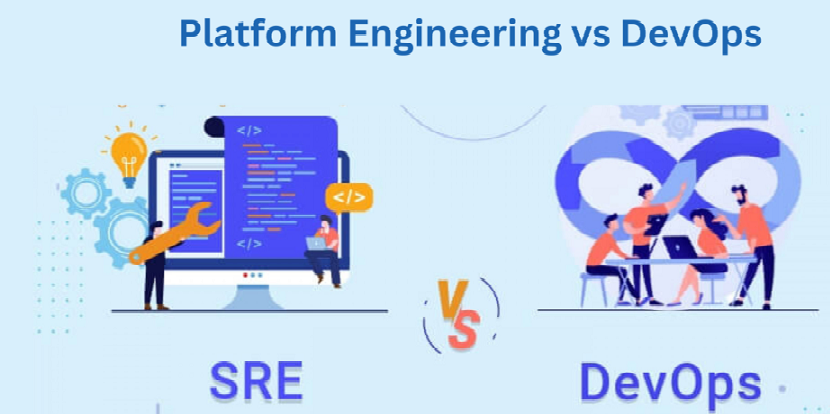In the fast-paced world of software development and IT operations, two terms often come up: Platform Engineering and DevOps. While they may seem similar at first glance, they have distinct roles and responsibilities within the realm of technology. In this blog post, we will explore both concepts, define them, and highlight the key differences between Platform Engineering and DevOps.

Platform Engineering
Definition: Platform Engineering refers to the practice of building and maintaining the foundational infrastructure, tools, and services that enable developers to create, deploy, and manage applications efficiently. Platform Engineers focus on creating a stable and scalable platform for software development, aiming to streamline the development process and reduce friction between development and operations teams.
Responsibilities of Platform Engineers
- Infrastructure Automation: Platform Engineers design and automate infrastructure provisioning and management processes. They use tools like Terraform and Ansible to create and maintain infrastructure as code (IaC).
- Containerization and Orchestration: They work with technologies like Docker and Kubernetes to containerize applications and manage their deployment and scaling.
- Monitoring and Logging: Platform Engineers set up monitoring and logging systems to ensure the health and performance of applications running on the platform.
- Security: They implement security best practices and access controls to protect the platform and its applications from threats.
- Scalability: Platform Engineers design the platform to scale horizontally and vertically, ensuring it can handle increased workloads.
DevOps
Definition: DevOps is a cultural and technical movement that aims to bridge the gap between development (Dev) and operations (Ops) teams. It emphasizes collaboration, automation, and continuous integration/continuous deployment (CI/CD) to deliver software faster and more reliably.
Responsibilities of DevOps Engineers
- Automation: DevOps Engineers automate repetitive tasks, including code builds, testing, and deployment, using tools like Jenkins, Travis CI, or GitLab CI/CD.
- Collaboration: They foster collaboration between development and operations teams, breaking down silos to ensure smoother workflows.
- Continuous Integration/Continuous Deployment (CI/CD): DevOps Engineers establish CI/CD pipelines to automate the testing and deployment of code changes, reducing manual intervention.
- Monitoring and Feedback: They implement monitoring and feedback loops to identify issues and provide insights for continuous improvement.
- Culture: DevOps is as much about culture as it is about tools and practices. DevOps Engineers promote a culture of collaboration, transparency, and accountability.
Key Differences
- Focus: The primary focus of Platform Engineering is on creating and maintaining the infrastructure and tools that enable development, while DevOps is more concerned with the collaboration and automation between development and operations teams.
- Scope: Platform Engineering deals with infrastructure, containerization, and orchestration, whereas DevOps covers a broader spectrum, including culture, collaboration, automation, and CI/CD.
- Responsibilities: Platform Engineers primarily work on infrastructure automation, scalability, and stability, while DevOps Engineers concentrate on the entire software delivery lifecycle, from code development to deployment and monitoring.
- Culture vs. Tools: DevOps places a strong emphasis on cultural change and collaboration, whereas Platform Engineering is more tool-centric and focused on infrastructure management.
In conclusion, while both Platform Engineering and DevOps play crucial roles in modern software development and operations, they have distinct focuses and responsibilities. Platform Engineers build and maintain the infrastructure, while DevOps Engineers foster a culture of collaboration and automation across development and operations teams. Understanding these differences is essential for organizations to effectively implement both practices and optimize their software development processes.
